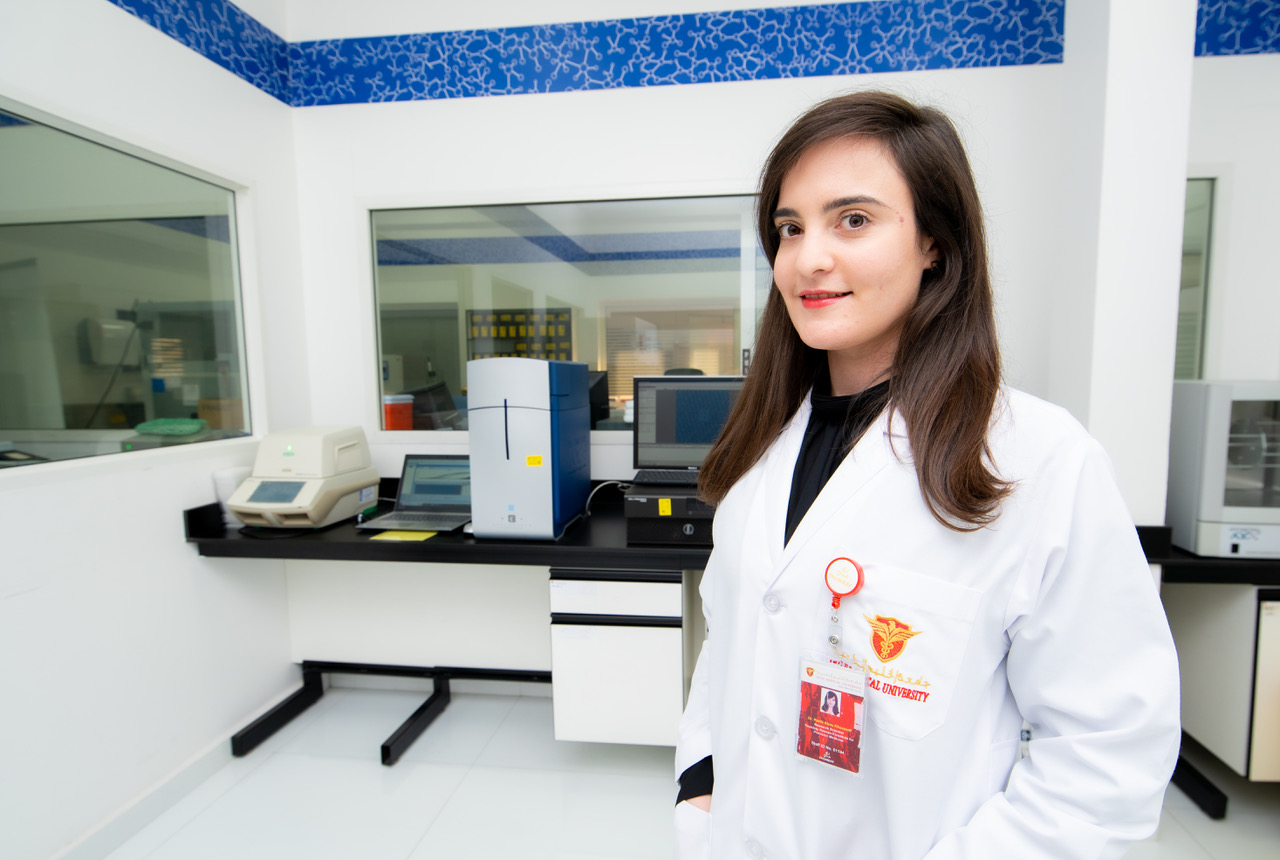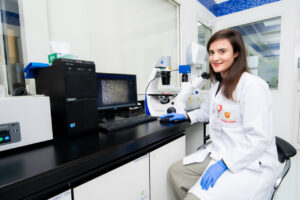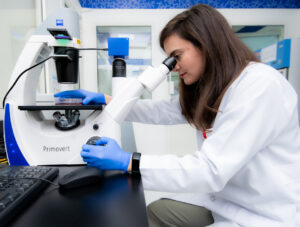As one of the winners of the L’Oréal-UNESCO For Women in Science Middle East Regional Young Talents Program 2022 Dr. Raefa Abou Khouzam is using the programme to further her research into new treatment strategies to counter pancreatic cancer growth and evolution.

Dr. Raefa Abou Khouzam
Pancreatic cancer is the deadliest type of solid tumour and is often undiagnosed until it’s too late. The hard complex ball-like object is not only made up of tumour cells, but of other cells and structures called stroma. Together, the stroma and tumour cells make up the tumour microenvironment (TME), which contains very little oxygen. This oxygen deprivation, referred to as hypoxia, plays a key role in making the tumour more aggressive, and resistant to therapy. Additionally, in most pancreatic cancer patients, cells multiply uncontrollably through a mutation in a gene known as KRAS, which causes the tumour to grow and become more resistant to cell death.
Dr. Raefa’s research focuses on a treatment that combines an agent that alleviates hypoxia with inhibitors marked to kill pancreatic tumour cells. The never-before-tested approach has the potential to counter two key processes that give pancreatic tumours life, thus leading to their elimination.
Here we find out more about her research and what it means to her to be selected for the L’Oréal-UNESCO For Women in Science Middle East Regional Young Talents Program 2022.
Can you give us a brief overview of your research and project?
My research is focused on better understanding and treating pancreatic cancer. This is a deadly disease that is understudied in the MENA region. In my research, I found that hypoxia, or low oxygen which occurs within the tumour microenvironment, is associated with worse survival in pancreatic cancer patients. My current aim is to test a drug that can reverse this hypoxic condition, which should lead to less aggressive tumours that can respond better to targeted therapy, and in particular, inhibitors targeting mutant KRAS. Indeed, another major culprit in the initiation and progression of pancreatic cancer is the oncoprotein, KRAS, which is mutated in more than 90% of cases. Combination treatment using an agent that can alleviate hypoxia, with inhibitors marked to kill pancreatic tumour cells, is a never-before-tested approach that has the potential to counter two key processes that give pancreatic tumours life, thus leading to their elimination.
Why is this an area or topic you were particularly passionate about?
My research is rooted in a dream of mine to do science that can impact the lives of cancer patients. Even though I have been fortunate enough to not have experienced the immense physical and emotional struggle of dealing with cancer, I have always believed that becoming a scientist would give me the opportunity to potentially make a real difference in the lives of the people who do. My motivation became even stronger after getting to know how far behind science is on offering effective treatments for pancreatic cancer patients compared to other tumour types. This further pushed my focus towards researching this disease.
What more would you like to see being done in the region surrounding this?
I would like to see more collaborative efforts among scientists and medical doctors in the region to pursue pancreatic cancer research. I would like to see more awareness campaigns for this disease. And I would also love to see more funding opportunities and support for early-career researchers who are motivated to do meaningful and impactful cancer research in the region.

What does it mean to you for your work to be recognised by a global institution such as L’Oreal?
This great honour has really given me confirmation that I am on the right track in my career. Becoming an alumnus in this initiative will forever empower me and give me the confidence and motivation to carry on with my research. I am very appreciative of the effort that is being undertaken by L’Oréal to recognize women in science in the region, and I can only hope that more organizations can be inspired by such efforts and follow suit.
What will this platform allow you to do in terms of furthering your work moving forward?
The importance of this award is that it gives women in science a platform to share their research, to inspire others, to support and be supported by the research community. It does not end with the award, the significance of such recognition will have a great ripple effect; as we know that once you start getting recognized for your achievements, more will surely follow. And so, I am hopeful that I will be able to get more funding in the future for my work, thanks to this award.
What is the biggest challenge you face in what you do?
As an assistant professor and research scientist, the biggest challenge I face is managing to give equal time and attention to my students and my research. Sometimes this leaves you with no time for yourself, but in the end, I think it is worth it.
In an industry that is often dominated by men, how do you ensure your voice is heard?
I think that just as in every other industry, the way to be heard is by showing your worth. By working your hardest and never giving up on what you believe you are entitled to. I am someone who has always believed that if you are putting in the effort needed, you will eventually be recognized.
What does it mean to you to represent your country in the world of science?
With everything going on in my home country, Lebanon, right now, all the hardship and heartache, I hope that by standing here today with this award, I can inspire someone to see that it is possible. My education started at the Lebanese University, a public university. And through passion and hard work, I was able to move to the UAE and pursue my dreams of becoming a research scientist, and assistant professor and pushing boundaries within my field. I am proud to be representing the UAE and Lebanon through this award.
What is something you would still like to do that you haven’t done yet?
Well, my bucket list is very long, but I know that is not what you are asking. Sticking to my career, my short-term goal is to give a talk at a big international scientific conference, such as the American Association for Cancer Research (AACR). My long-term goal is to run my own research lab.

What is the professional motto that you live by?
To publish scientific research, experiments need to be carried out, or hypotheses need to be tested, so it is important not to dismiss ideas before actually trying them out. In that respect, my adapted professional motto is “nothing ventured, nothing gained”.















